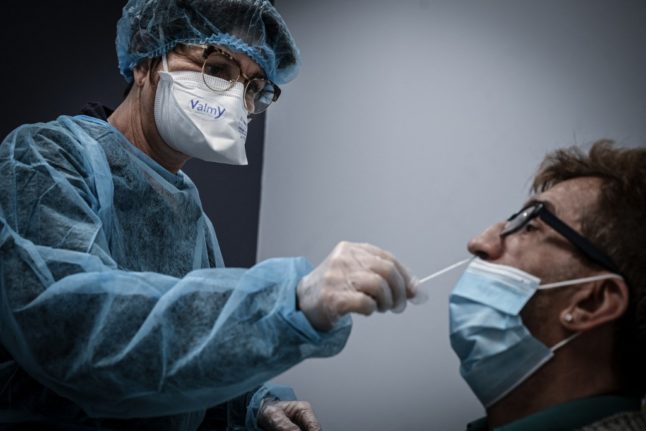Getting a Covid test in France is, fortunately, a pretty straightforward procedure, even for visitors.
READ ALSO: How can tourists and visitors in France get a Covid test?
However, you might not be able to find a pharmacy or testing centre where the staff speak English, especially if you are in a rural part of France.
First, some quick testing vocab:
Dépister – to test
Dépistage – testing
Un test Covid – a Covid test
Un test PCR (pronounced pay-say-air) – a PCR test
Un test antigénique – an antigen test, referred to as a lateral flow test in some countries
Un autotest – a self-test
Test salivaire – saliva test
Test sérologique – antibody test (some testing centres offer these finger-prick tests in addition to the nasal swabs, to determine if you have previously had Covid)
S’isoler – self-isolate
Une ordonnance – a prescription (you won’t need this to get tested for Covid in France)
Sans rendez-vous – no appointment, ie a walk-in centre
When making an appointment to get a Covid test:
Bonjour, je voudrais prendre un rendez-vous pour faire un test Covid, s’il vous plaît – Hello, I’d like to get an appointment for a Covid test, please.
J’aimerais bien faire un test PCR / antigénique / sérologique – I’d like to do a PCR / antigen / antibody test.
Combien coûte le test ? – How much does the test cost?
Oui, j’ai une carte vitale / Non je n’ai pas de carte vitale. – Yes, I have a French health security card / No, I don’t have a French health security card. [if you don’ have the card you can still get a test, but you will likely have to pay for it. Costs vary but are capped at €22 for an antigen test, €54 for a PCR test]
Non, je n’ai jamais eu la Covid. – No, I’ve never had Covid.
Oui, j’ai déjà eu la Covid, il y a quelques mois. – Yes, I’ve already had Covid, a few months back.
If you’re trying to get tested without an appointment:
Est-il possible de faire un test Covid sans rendez-vous ? – Is it possible to get a Covid test without an appointment?
Before getting the test, the health staff might ask you:
Presentez-vous des symptômes à la Covid-19 ? – Do you present Covid-19 symptoms?
Some symptoms you might want to describe are;
- Une toux – a cough
- Un mal de tête – a headache
- Une fièvre – a fever
- Des difficultés à respirer – difficulty breathing
- La fatigue – tiredness
Êtes-vous cas contact ? – Are you a contact case?
Voulez-vous un test antigénique ou PCR ? – Do you want an antigen test or a PCR test?
When getting tested, you might want to say:
Dans combien de temps arrivent les résultats ? – How long does it take for the results to arrive?
Comment allez-vous me contacter? – How are you going to get in touch with me?
Par SMS – by SMS or text message
Par mel/par courriel – by email
Est-ce que ça fait mal ? – Does it hurt?
Aïe, ça fait mal ! – Ouch, that hurt! (hopefully won’t need this one).



 Please whitelist us to continue reading.
Please whitelist us to continue reading.
Member comments